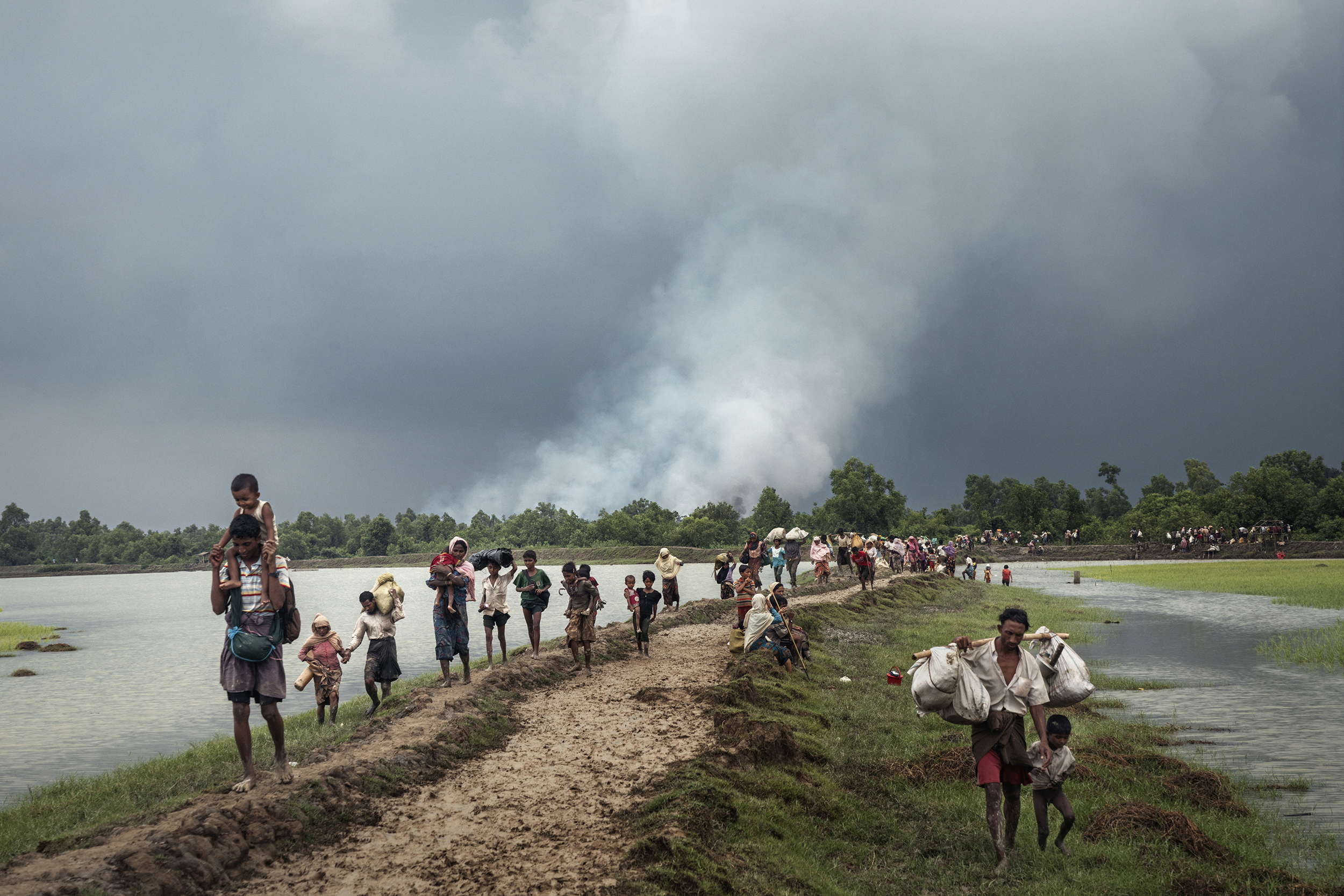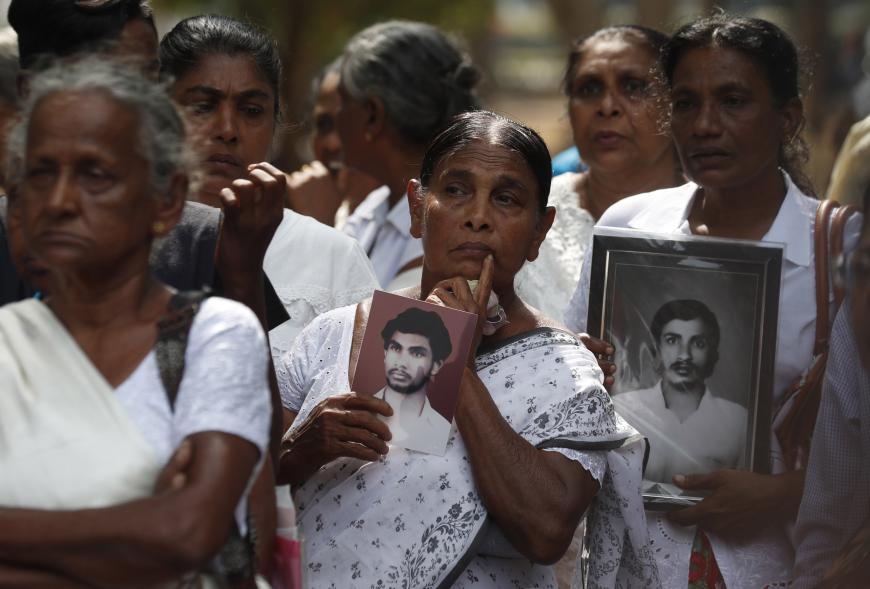Targeted Human Rights Sanctions
Advocating for new accountability tools

Rohingya refugees crossing from Myanmar into Bangladesh. © Adam Dean/Pano
History of ACIJ advocacy in seeking sanctions law reform
There are times when the criminal justice process may be unattainable, unfeasible or too slow to act, and perpetrators of grave crimes spend years on the run without suffering any consequences for their crimes. Other tools are therefore needed to step up to the plate – the words of Geoffrey Robertson QC. Throughout 2020 and 2021, the Australian Centre for International Justice worked alongside others to advocate for the introduction of a targeted human rights sanctions regime in Australia.
In February 2020, we made a submission to a Parliamentary Inquiry by the Joint Standing Committee on Foreign Affairs, Defence and Trade regarding whether Australia should introduce, Magnitsky style, human rights targeted sanctions laws.
In March 2020, we were invited to provide evidence to the Committee at a hearing. The Committee heard evidence throughout the year from impacted diaspora communities, academics and high-profile lawyers and advocates from around the world, including Geoffrey Robertson QC. Our recommendations included that a sanctions determination process ensures contribution of civil society and NGOs, and that an independent committee be established to provide recommendations, monitoring and guidance. These recommendations, among others, were accepted by the Parliamentary Committee in its report released in November 2020.
On 8 December 2021, we welcomed Australia’s adoption of a targeted human rights sanctions regime through the passing of the Autonomous Sanctions Amendment (Magnitsky-style and Other Thematic Sanctions) Bill 2021. This Bill amended the Autonomous Sanctions Act 2011, thereby creating a thematic sanctions regime to address serious violations of human rights, serious violations of international humanitarian law, serious corruption and other matters of concern. The amendments to Australia’s sanctions regime did not, however, take into account our key recommendations accepted by the Parliamentary Committee.
The Autonomous Sanctions Act 2011 and accompanying Autonomous Sanctions Regulations 2011 allow for the imposition of targeted financial sanctions and travel bans against perpetrators, immediate family members and beneficiaries of serious violations of human rights, serious violations of international humanitarian law and serious corruption. The regime is administered by the Australian Sanctions Office.

Current focus
The introduction of Australia’s human rights sanctions regime represents a unique opportunity for Australia to protect and promote human rights globally, particularly in the Asia-Pacific region, by targeting human rights abusers and corrupt actors, as well as promoting accountability. The regime has the ability to strengthen Australia’s capacity to respond to human rights violations globally and target those persons and entities involved in acts of significant corruption and severe breaches of human rights.
Yet, since the regime came into effect, it has only been utilised a small number of times, against persons and entities in Russia and Iran.
The Australian Centre for International Justice will continue to advocate for a robust, effective and consistent targeted human rights sanctions regime in Australia. We will also continue to advocate, amongst other things, for effective engagement by the Minister of Foreign Affairs and the Department of Foreign Affairs and Trade in liaising with civil society organisations to identify persons and entities who should be the target of human rights sanctions.
The Australian Centre for International Justice partners with organisations to submit recommendations to the Minister for Foreign Affairs, through the Department of Foreign Affairs and Trade, about individuals and entities who should be subject to targeted human rights sanctions. We also partner with organisations to bring attention to, and call for Australian authorities to take action on, potential breaches of Australia’s sanctions laws by individuals and organisations.
Latest on Targeted Human Rights Sanctions
Joint Media Release: AFP fails to investigate visiting Sri Lankan General for war crimes; groups now declare #TimetoSanction under Australia’s new Magnitsky regime
Read Media Release PDF (English) Joint Media Release: AFP fails to investigate visiting Sri Lankan General for war crimes; groups now declare #TimetoSanction under Australia’s new Magnitsky regime 31 March 2022 Australian Tamils and human rights groups have called on...
Media Release: Welcoming Australia’s adoption of Magnitsky-style targeted sanctions for serious human rights abuses
1 December 2021 The Australian Centre for International Justice (ACIJ) welcomes the adoption of targeted human rights sanctions to address serious human rights abuses and corruption around the world. The Autonomous Sanctions Amendment (Magnitsky-style and Other...
Media Release: Recommendations to adopt human rights targeted sanctions laws in Australia are welcome
7 December 2020 The Australian Centre for International Justice (ACIJ) welcomes the report of a Parliamentary committee which has recognised the need for Australia to adopt stand alone targeted sanctions legislation to address human rights violations and corruption...
Submission: Australian human rights sanctions regime
The Australian Centre for International Justice (ACIJ) has recommended that the Australian Government introduce a new human rights targeted sanctions regime. The submission was made to the Parliamentary Joint Standing Committee on Foreign Affairs, Defence and Trade...
The Australian Centre for International Justice fights to hold accountable those responsible for the most serious international crimes. It continues to be an enormous challenge.
We work with survivors of torture, sexual violence, genocide and war to research and develop strategies to fight for justice.
We are Australia’s first specialist legal centre providing strategic advice and representation to people seeking justice and accountability.
We take action against the impunity of those responsible for committing atrocity crimes. We all benefit by supporting communities in Australia and around the world access justice.
We need your support to fight for justice.
Join us to advance international justice in Australia and make a tax-deductible donation to support our work and help us push our projects and litigation.


